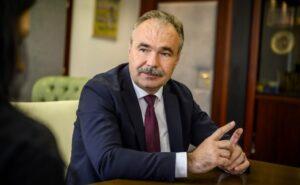István Nagy: the 21st century rebirth of Hungarian agriculture is our work
The 21st century rebirth of Hungarian agriculture is visible in Mélykút, this is our work, our responsibility – stated István Nagy, Minister of Agriculture, at the handover of the Bács-Tak group’s waterfowl breeding farm in Mélykút on Monday. He added: in order to ensure the safety of Hungarian livestock farming and waterfowl farming, these developments are necessary.

(Photo: drnagyistvan.hu)
In order for these investments to be realized, the Hungarian government had to make a strategic decision at the most difficult time, that is, to increase the national co-financing rate for investments in the strategic plan of the Common Agricultural Policy to the maximum of 80 percent – he said. With this, the Hungarian government tripled the resources available for investments, providing a historic response to the challenges of the times – he pointed out.
One of the country’s largest and most modern farms to be handed over in Mélykút
He congratulated the group of companies on the development, indicating that such a scale of development could not have been realized without committed domestic entrepreneurs, such as the leaders of the Bács-Tak group of companies, who build, invest, and apply the most modern technologies in the name of sustainability, innovation, and quality. István Nagy stated that the farm was realized with nearly 2 billion forints of state support and is more than a simple livestock farm: it is a unified system of quality, safety, epidemic control, and animal welfare. “A new standard in animal husbandry” – said the minister, adding that up to 1.2 million ducks can be raised annually on the 30 thousand square meters of rearing area, where animal welfare is ensured by the automation of feeding, watering, temperature control, and ventilation. The closed technology and strict hygiene regulations guarantee maximum safety, he explained. The strictest rules are being introduced by international standards, in order to ensure the transparency of production and the most important values of the Hungarian food industry: quality and food safety. According to István Nagy, this not only gives new impetus to the region, but also further strengthens the Hungarian poultry sector, which not only plays a decisive role in domestic supply, but also provides a significant export base. He emphasized that further efforts are needed to maintain the market position. “We can only build a strong and crisis-resistant sector if we continuously develop it,” he said. The Hungarian government supports livestock farmers in this too, including poultry farmers.
In support of this, he highlighted: since 2015, 9 tenders have been launched for site development, and over ten years
Until July 2025, 365 billion forints have been paid to livestock farms for the development of their sites, which means 3,300 investments. That is why you can see renewed and brand new farms all over Hungary, he said. 167 billion forints were spent on the development of poultry farms, which helped renew more than 500 poultry farms. Of these, 85 were for the development of waterfowl farms, for which 32 billion forints were spent, according to his statement. The work continues: support for livestock keepers and breeders is being ensured continuously with the CAP strategic tenders, last year support for investments in livestock farms was announced, support decisions were made in the first round for smaller-scale investments, 209 applications were supported, with a support amount of approximately 10.7 billion forints – he explained, indicating that new support decisions are being made every week. The range of possibilities was wide in the tenders, it was possible to apply for the construction of new buildings, the purchase of equipment and machinery, energy renovation, animal welfare investments, as well as reducing the risk of epidemic animal diseases. He mentioned that the smaller-scale tender, which provided a maximum of 200 million forints of support, had a budget of 50 billion forints, and the larger-scale tender, which provided a maximum of 5 billion forints of support, had a budget of 150 billion forints.
A total of 1,857 applications were received for the two calls
Of these, a total of 860 billion forints of support was requested – the Minister announced, emphasizing: the numbers clearly indicate the development intentions of livestock farmers. They will do everything to reallocate resources and declare all valid applications successful, because they want to increase the competitiveness of Hungarian agriculture – he said. The Bács-Tak Group is one of Hungary’s leading waterfowl breeding and sales groups, which works in closed, vertical integration, meaning that everything from mixed feed production to poultry breeding and processing, up to and including sales, is carried out by companies belonging to the group. It carries out its activities in Southern Hungary at 17 locations, and depending on the period, it has a contractual relationship with 50-100 wage breeders. The number of employees is almost 500, and it also employs 150-200 temporary workers from time to time. The group’s annual consolidated sales revenue is close to 20 billion forints, and it processes and sells nearly 30 thousand tons of roast duck and meat goose annually. Nearly two-thirds of sales are exported to Western Europe.
MTI
Related news
József Viski: Adaptation and competitiveness are key for the horticultural sector
🎧 Hallgasd a cikket: Lejátszás Szünet Folytatás Leállítás Nyelv: Auto…
Read more >In 2025, FruitVeB considered the support and professional coordination of the TÉSZs as its priority task
🎧 Hallgasd a cikket: Lejátszás Szünet Folytatás Leállítás Nyelv: Auto…
Read more >Related news
Innovations, success stories and awards on the same stage
🎧 Hallgasd a cikket: Lejátszás Szünet Folytatás Leállítás Nyelv: Auto…
Read more >Farewell day at the 60th anniversary EuroShop trade fair
🎧 Hallgasd a cikket: Lejátszás Szünet Folytatás Leállítás Nyelv: Auto…
Read more >NAV: Women’s Day inspections begin
🎧 Hallgasd a cikket: Lejátszás Szünet Folytatás Leállítás Nyelv: Auto…
Read more >








